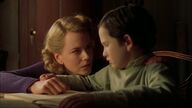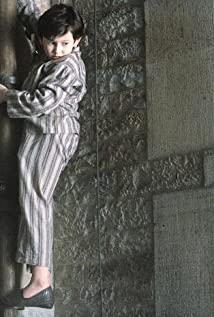The text is transferred from: A war without gunpowder - "Apocalypse" Author: Li Xinyuan invaded and deleted
The movie "The Others" (Chinese translation of "The Island") is a classic psychological thriller written and directed by the cutting-edge Spanish director Alejandro Amenabar. It won 8 awards at the Spanish Film Academy Award, the "Goya Awards", including Best Picture and Best Director, and was the first English-language film to win the "Goya Award"; in 2001 the film Winner of the Saturn A-wards for Best Horror Film, which won the Golden Globe and British Film and Television for its star Nicole Kidman Academy of Arts Award" (BAFTA) nomination.
The film tells the story of Grace raising two children, Anne and Nicholas, alone in a mansion on a small island after World War II, waiting for her husband to return from the war. Because the children are severely allergic to light, the curtains in the house are drawn tightly. One day the servant left without saying goodbye, and she hired three more servants, Mrs. Miller, the nanny, Mr. Teto the gardener, and Linda, the dumb maid. A series of strange things began to happen, the piano would automatically sound, the door would automatically open and close, and Ann also said that she saw a little boy named Victor. Gradually, Grace felt that the house was surrounded by a strange and mysterious atmosphere, and she became uneasy. Everything becomes confusing, are there really other people in the room besides them? The story is pulled by a strong suspense from beginning to end, that is, who are the real intruders? And the film's final The ending subverts people's habitual thinking: it turns out that Grace and her two children and three servants are ghosts, and only the Victor family who appears at the end are the real people living in the house. Grace killed the child and then committed suicide, and the servants died of tuberculosis more than fifty years ago. When the film begins Grace wakes up from a nightmare, they are already dead, so the two children are allergic to light. Although there is no gunpowder smoke or blood in the film, after the truth is revealed, people are left with a profound reflection on the war. From the perspective of modern literary criticism, this paper reveals the war-distorted human nature and the destruction of the human mind by war by analyzing the artistic features and expressive techniques of this film.
The use of symbolism
As a very important literary school in the history of modern literature, Symbolism was born in France in the mid-19th century, and gradually influenced European and American countries. By the 1920s, its influence has continued to this day, and it has penetrated into various literary genres. among. It is against the background of increasingly acute capitalist social contradictions, people face the cruel real world and ugly social phenomena, and use art to find spiritual sustenance in extreme depression and helplessness. Symbolist artists believe that only with "intuition" and some irrational and mysterious inner experiences can we recognize truth, appreciate and create beauty. They are strongly opposed to directly stating the facts and expressing their hearts directly, but emphasize "suggestion" and "symbol" to form a hazy, obscure, riddle-like artistic style. They emphasize imagination and demand to give abstract ideas a concrete and textured perceptual form. For example, in the film "Frightening Island", the pervasive fog and the tragic fate of the protagonist constitute a hidden and symbolic connection.
The story in the film takes place in Jersey, England. Jersey is the farthest British island in the English Channel from the British Isles. It is only 24 kilometers away from the coastline of Normandy, France. It was occupied by Germany during World War II. From the very beginning of the film, the entire island and Grace's house were shrouded in a perpetual fog. The thicker and thicker fog, the gloomy sky and the ancient buildings together create a mysterious and depressing atmosphere, which seems to tell people that although the Second World War has ended, the impact of the war is far from being eliminated.
The heroine Grace in the film is a devout Christian who cherishes his teachings. She tells children the Bible story of God's creation of the world, and preaches to them that those who devote themselves to their religion will go to heaven, while those who follow their faith will go to prison. In order to punish Ann for her treason, she even cruelly locked her daughter up. When Grace discovers a series of weird things at home, her first reaction is to turn to the priest. And the priest was late, so she could only ask for it in person, but she got lost in the fog. In the world-famous fog city, and on an island surrounded by sea, heavy fog is a common weather phenomenon, but here it has become a symbol of mysterious power. The fog in the film not only shows that Grace is bewildered by the strange things in life, but also uneasy about her husband's life and death, and the unpredictable fate. Even the god she believes in the most seems to have abandoned her and hides in the fog. In the face of war, God seems powerless to protect his faithful people. Grace's mental confusion and helplessness are like a person sailing a boat in a foggy sea. For the audience, the fog is a mystery, and all guesses are possible before the mystery is revealed.
2. The embodiment of gynocentric theory
Although there are great differences in the subject matter, creative techniques and artistic styles of literary works, the essence of them expressing life and reflecting reality is the same. In modern society, men occupy a dominant position in various fields such as politics, economy, science, and culture, and have absolute control and discourse power. Women have always been in a subordinate and passive position. Reflected in literary works, men are often the absolute protagonists, and women only play a role of embellishment or foil. Because in people's subconscious, men represent masculinity, strength, a symbol of strength and bravery, while women are synonymous with weakness, timidity, and withdrawal. It plays an insignificant role in the traditional patriarchal society. However, the film "Frightening Island" completely subverted the sovereign status of men, reflecting the color of gynocentrism. Grace, as the well-deserved protagonist, moved all the audience with her courage, perseverance and persistence: she is not only a wife who cares for her husband, a mother who loves her children, but also a woman who is always ready to pick up a gun to fight against fascism and invaders. Warriors who defend their homeland.
In the film, apart from the cowardly Nicholas and Victor, there are only three adult males, Grace's husband Charles, the gardener Mr. Teto and Victor's father. And Victor and his father didn't even show up until the last scene, and they didn't even have a line from start to finish. Mr. Teto is an even more insignificant figure. He didn't make many appearances, barely spoke, and obeyed Mrs. Miller, the nanny. The only male protagonist, Charles, is completely lifeless in several appearances. At first, his soul was wandering in the woods after his death, and he happened to meet his wife Grace who went out to find the priest, and they brought them home together. After spending the night with his wife, daughter and son, because he was leaving again, Grace had a heated quarrel with him, asking him, "The war is over, why do you want to leave?" Charles was speechless, but ran away from home anyway . His empty eyes, bleak expression, few words, and rigid movements are far from the image of the hero on the battlefield and the pillar of the family in the audience's mind. Therefore, the thinness and insignificance of the male characters in the film just contrasts the plump and brave female image of Grace, and the appearance of the gun several times proves her courage and courage. First, viewers learn from her account that she beat the fascist soldiers who were trying to occupy the home; then when Grace discovers that the curtains on which the children were allergies to light had disappeared overnight, it was confirmed that there was an intruder in the home. She picked up the gun and looked around; when she discovered that Mrs. Miller and the other three were actually dead fifty years ago, she raised the gun again. From this, it is not difficult to see that Grace is an independent and strong woman. Her fearless spirit in protecting her children and her homeland is admirable, showing that in an environment where men are missing, women can share or even replace men's parts. Responsibility. That is to say, even if they are women physically, they may become the voice of male theory or the agent of patriarchal ideology in psychological consciousness. However, Grace is a woman after all. Due to the disappearance of her husband during the war, she had to face the cruel life alone, take care of minor children, and struggle to support a family. Lonely, fearful, and anxious, she finally broke down and did something wrong that she regretted for a lifetime but could not make up for. At the end of the film, the audience realized that Grace was overwhelmed, accidentally killed two children, and shot herself. It is her and the children's souls who live in this house. In the film, except for Grace's tearful recollection of the scene at the end, the only time she shed tears was the night when she failed to find the intruder, and she cried helplessly and desperately holding the cold pillow: "Charles, where are you?" Grace's momentary weakness is acceptable, both from a traditional masculinist perspective and from a radical feminist perspective, because the source of this tragedy is war. It not only hurts the human body, but also hurts the human spirit. And once it is involved in the war, the trauma it brings to people is permanent and indelible. Just as the war is over, Charles will return to the battlefield, he will never escape the war, not even after death, forever. This shows how much the war has tormented a person's soul! Although Grace did not go to the battlefield in person, she and her two children were indirectly victims of the war.
3. The return and redemption of the soul
"Return" is an eternal theme in literary and artistic creation. With the development of modern civilization and machine industry, human beings are getting farther and farther away from their spiritual homeland and spiritual homeland. The background of the story of "The Island" is frozen after the end of World War II. After experiencing the life and death of the war, the hero and heroine are full of exhaustion and trauma, and they all have a strong desire to return to their homeland, return to their hometown, whether it is spiritual, physical, or even soul. This theme in the film is played out through three threads that develop in parallel. First of all, Mrs. Miller and the other three have been dead for more than 50 years. When they learned that Grace needed servants, out of loyalty to the original owner and nostalgia for the house, they returned to the place where they once worked and lived. ;Secondly, Charles was killed in the war, his soul could not find his way home, wandering alone in the thick fog and in the dense forest, until he met Grace; what is more worth mentioning is that at the beginning of the film, Grace and the children are dead, but their souls have not left the house. Until the end of the film, they realize that they are the real intruders, but they still refuse to leave, and firmly declare: This house is ours! There are almost three possibilities: one is the love for home and hometown; the other is waiting for Charles to return, looking forward to the reunion of the family, afraid that he will be empty after he returns, and he will not be able to find his wife and children; the third is to defend the fruits of victory . They had just driven out the German fascists, and their war-torn homeland was deserted and in ruins. Thinking of the United Kingdom, France and the entire European continent, as well as other countries and regions that were devastated by war in World War II, it is not only the houses that are expected to be rebuilt, but also the hearts of people devastated by the war. Therefore, the film highlights the theme of return, calling on those warriors who fought bloody battles and those foreigners who lived in other countries to escape the disaster of war to return physically and mentally, not only for the peace construction of their hometown and hometown, but more importantly, to find a safe haven for the soul, A warm home, a permanent belonging.
The heroine in the film is named Grace, which is a religious and meaningful name. Grace refers to "a brief prayer of thanksgiving (before or after a meal) or God's mercy and grace to mankind", which can also be extended to mean graceful and charming manners. Well-known American actress Nickel Kidman plays the role appropriately. She combines beauty and wisdom to portray the image of a God-believing mother to life. As the plot progresses, three mysterious servants enter the family, and their appearance is so abrupt that even the audience cannot fathom their true purpose. The first was uninvited, Grace thought they had seen the job ad, only to find out that the ad was still in the mailbox; the second was the weird personality. Linda didn't speak, but could hear; Mrs. Miller was always calm, her eyes were unfathomable, and many words had a lot of meaning; Mr. Teto showed very little and ghostly. Grace had always had doubts about their identities, and even suspected that they were the source of a chain of weirdness, and her suspicions were later confirmed: the three were indeed ghosts. But here's the ingenious thing about the movie: By the end of the film, the audience realizes that Grace and the two children are ghosts too. So the significance of the appearance of the three servants is not difficult to understand. They seem to be adhering to the will of God to redeem the Grace family. Mrs. Miller was always rambling, and Mr. Teto was always evasive, and later they designed the children to discover the tombstone and Grace to see Victor and his family. Through the conversation between the possessed witch and Ann, the poor mother finally believes that she and her child are dead, they are real ghosts, and the people living in the house are the Victor family. When it was determined who was the real intruder, everyone felt at ease. Although he did not enter the imagined paradise after death, for Grace, a mother who loves her children, the place where she has children is paradise; and Charles' soul will come back one day, and he will forgive the wife who killed her child by mistake in despair, and the family There is always a chance to be reunited; the children also find their true selves, and in the face of their mother's hysteria and their father's silence, they will no longer live in fear, no longer afraid of the sun; and the three servants will no longer have to hide With his own identity, he can get along with the Grace family calmly; the Victor family knew the story of what happened in this house through the witch and decided to move. Of course the whole process of redemption is painful, but the end result is complete. Grace and two children bathed in the sun and watched Victor leave in the car. "For Sale" on the gate
Closing remarks:
The shock of the film "A Little Island" is huge, not only because of the unexpected ending, but also because of the silent indictment of the war. Without World War II, what a wonderful family would Grace, Charles and their children be as middle class: a beautiful wife, a caring husband, healthy children, a wealthy family, and a peaceful life. But all this was destroyed by the war. First, Charles was killed in battle, and then Grace killed the child by mistake. She shot herself in remorse and despair, and even the family became ghosts and could not be reunited. The film takes World War II as the background, and through the actors' delicate performances and beautiful and moving pictures, the touching and tragic plots are shown to the audience step by step. Sad and moving, with high aesthetic value. Through the tragedy of an ordinary family, it profoundly exposes the evil of war and the destruction of human nature and spirit by war, and sublimates the theme of human beings calling for a peaceful and happy life.
The text is transferred from: A war without gunpowder - "Apocalypse" Author: Li Xinyuan invaded and deleted
The text is transferred from: A war without gunpowder - "Apocalypse" Author: Li Xinyuan invaded and deleted
The text is transferred from: A war without gunpowder - "Apocalypse" Author: Li Xinyuan invaded and deleted
View more about The Others reviews











